The Intel Core i9-9980XE CPU Review: Refresh Until it Hertz
by Ian Cutress on November 13, 2018 9:00 AM ESTHEDT Performance: Encoding Tests
With the rise of streaming, vlogs, and video content as a whole, encoding and transcoding tests are becoming ever more important. Not only are more home users and gamers needing to convert video files into something more manageable, for streaming or archival purposes, but the servers that manage the output also manage around data and log files with compression and decompression. Our encoding tasks are focused around these important scenarios, with input from the community for the best implementation of real-world testing.
All of our benchmark results can also be found in our benchmark engine, Bench.
Handbrake 1.1.0: Streaming and Archival Video Transcoding
A popular open source tool, Handbrake is the anything-to-anything video conversion software that a number of people use as a reference point. The danger is always on version numbers and optimization, for example the latest versions of the software can take advantage of AVX-512 and OpenCL to accelerate certain types of transcoding and algorithms. The version we use here is a pure CPU play, with common transcoding variations.
We have split Handbrake up into several tests, using a Logitech C920 1080p60 native webcam recording (essentially a streamer recording), and convert them into two types of streaming formats and one for archival. The output settings used are:
- 720p60 at 6000 kbps constant bit rate, fast setting, high profile
- 1080p60 at 3500 kbps constant bit rate, faster setting, main profile
- 1080p60 HEVC at 3500 kbps variable bit rate, fast setting, main profile
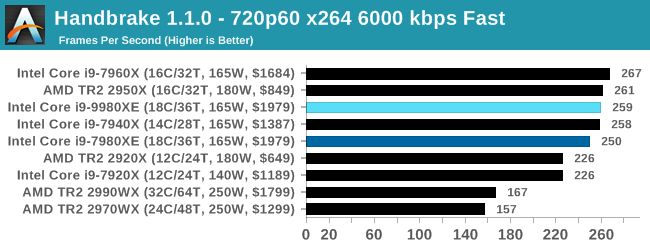
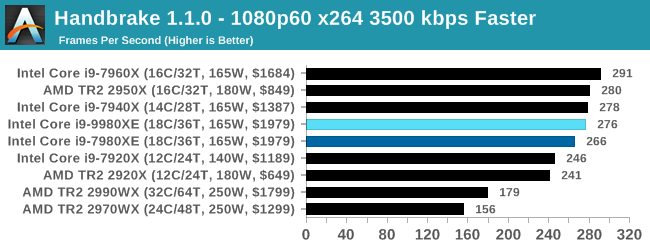
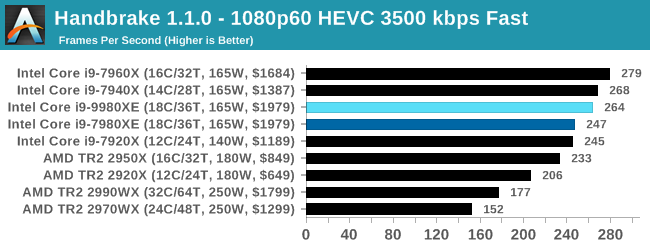
The 9980XE performs better than the 7980XE in our testing by a few percentage points, however these tests seem to benefit from fewer cores and a better turbo frequency profile.
7-zip v1805: Popular Open-Source Encoding Engine
Out of our compression/decompression tool tests, 7-zip is the most requested and comes with a built-in benchmark. For our test suite, we’ve pulled the latest version of the software and we run the benchmark from the command line, reporting the compression, decompression, and a combined score.
It is noted in this benchmark that the latest multi-die processors have very bi-modal performance between compression and decompression, performing well in one and badly in the other. There are also discussions around how the Windows Scheduler is implementing every thread. As we get more results, it will be interesting to see how this plays out.
Please note, if you plan to share out the Compression graph, please include the Decompression one. Otherwise you’re only presenting half a picture.
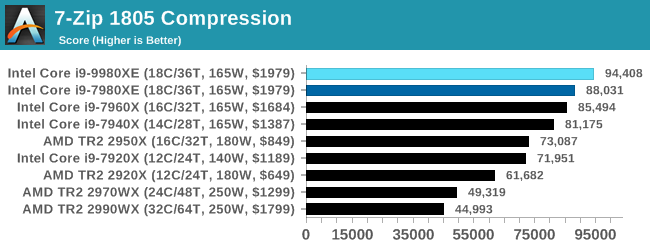
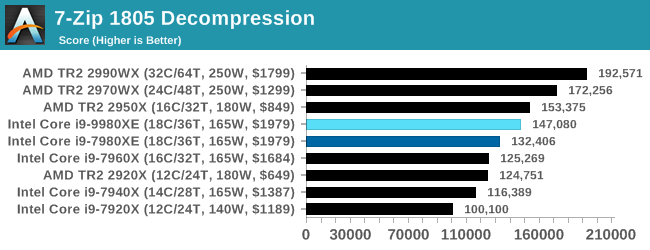
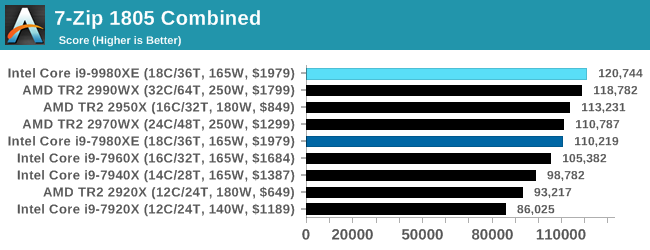
The increase in performance in both compression and decompression over the 7980XE pushes the 9980XE to the top of the overall standings.
WinRAR 5.60b3: Archiving Tool
My compression tool of choice is often WinRAR, having been one of the first tools a number of my generation used over two decades ago. The interface has not changed much, although the integration with Windows right click commands is always a plus. It has no in-built test, so we run a compression over a set directory containing over thirty 60-second video files and 2000 small web-based files at a normal compression rate.
WinRAR is variable threaded but also susceptible to caching, so in our test we run it 10 times and take the average of the last five, leaving the test purely for raw CPU compute performance.
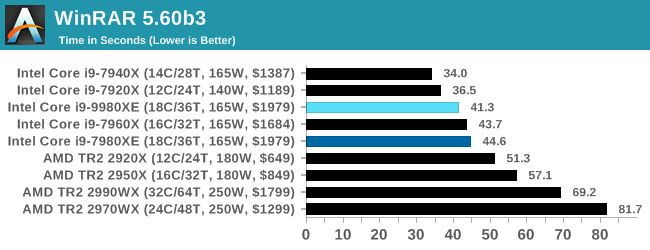
With WinRAR being a variable threaded and memory sensitive tool, while the 9980XE performs better than the 7980XE, having fewer Intel cores seems to work best.
AES Encryption: File Security
A number of platforms, particularly mobile devices, are now offering encryption by default with file systems in order to protect the contents. Windows based devices have these options as well, often applied by BitLocker or third-party software. In our AES encryption test, we used the discontinued TrueCrypt for its built-in benchmark, which tests several encryption algorithms directly in memory.
The data we take for this test is the combined AES encrypt/decrypt performance, measured in gigabytes per second. The software does use AES commands for processors that offer hardware selection, however not AVX-512.
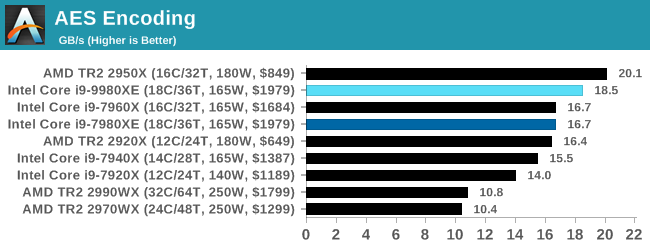
AES encoding seems to prefer AMD's situation, although the way the >16 core TR2 parts are configured is more of a hindrance. As expected, the i9-9980XE is the best Intel performer here.










143 Comments
View All Comments
MisterAnon - Wednesday, November 14, 2018 - link
PNC is not right at all, he's completely wrong. Unless your job requires you to walk around and type at the same time using a laptop is a net loss of producitivity for zero gain. At a professional workplace anyone who thinks that way would definitely be fired. If you're going to be in the same room for 8 hours a day doing real work, it makes sense to have a desktop with dual monitors. You will be faster, more efficient, more productive, and more comfortable. Powerful desktops are more useful today than ever before due to the complexity of modern demands.TheinsanegamerN - Wednesday, November 14, 2018 - link
What is your source for gamers being the primary consumers of HDET?imaheadcase - Tuesday, November 13, 2018 - link
Well of course for programming its ok. That is like saying you moved from a desktop to a phone for typing. It requires nothing to type hardly for power. lol That pretty much as always been the case.bji - Tuesday, November 13, 2018 - link
I think you are implying programming is not a CPU intensive task? Certainly it can be low intensity for small projects, but trust me it can also use as much CPU as you can possibly throw at it. When you have a project that requires compiling thousands or tens of thousands of files to build it ... the workload scales fairly linearly with the number of cores, up to some fuzzy limit mostly set by memory bandwidth.twtech - Thursday, November 15, 2018 - link
I also work in software development (games), and my experience has been completely the opposite. I've actually only known one programmer who preferred to work on a laptop - he bought a really high-end Clevo DTR and brought it in to work.I do have a laptop at my desk - I brought in a Surface Book 2 - but I mostly just use it for taking notes. I don't code on it.
Unless you're going to be moving around all the time, I don't know why you'd prefer to look at one small screen and type on a sub-par laptop keyboard if there's the choice of something better readily available. And two 27" screens is pretty much the minimum baseline - I have 3x 30" here at home.
:And then of course there's the CPU - if you're working on a really small codebase, it might not matter. But if it's a big codebase, with C++, you want to have a lot of cores to be able to distribute the compiling load. That's why I'm really interested in the forthcoming W3175x - high clocks plus 28 cores on a monolithic chip sounds like a winning combination for code compiling. High end for a laptop is what, 6 cores now?
Laibalion - Saturday, November 17, 2018 - link
What utter nonsense. I'be been working on large and complex c++ codebases (2M+ LOC for a single product) for over a decade, and compute power is an absolute necessity to work efficiently. Compile times such beast scales linearly (if done properly), so no one wants a shit mobile cpu for their workstation.HStewart - Tuesday, November 13, 2018 - link
Mobile has been this way for decade - I got a new job working at home and everyone is on laptops - todays laptop are as powerful as most desks - work has quad core notebook and this is my 2nd notebook and first one was from nine years ago. Desktops were not used in my previous job. Notebook mean you can be mobile - for me that is when I go to home office which is not often - but also bring notebook to meeting and such.I am development C++ and .net primary.
Desktop are literary dinosaurs now becoming part of history.
bji - Tuesday, November 13, 2018 - link
You are not working on big enough projects. For your projects, a laptop may be sufficient; but for larger projects, there is certainly a wide chasm of difference between the capabilities of a laptop and those of a workstation class developer system.MisterAnon - Wednesday, November 14, 2018 - link
Today's laptops are not as powerful as desktops. They use slow mobile processors, and overheat easily due to thermals. If you're working from home you're still sitting in a chair all day, meaning you don't need a laptop. If your company fired you and hired someone who uses a desktop with dual monitors, they would get significantly more work done for them per dollar.Atari2600 - Tuesday, November 13, 2018 - link
I wouldn't call them very "professional" when they are sacrificing 50+% productivity for mobility.Anyone serious about work in a serious work environment* has a workstation/desktop and at least 2 of UHD/4k monitors. Anything else is just kidding yourself thinking you are productive.